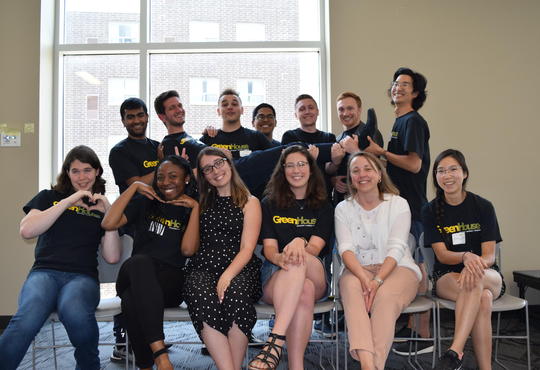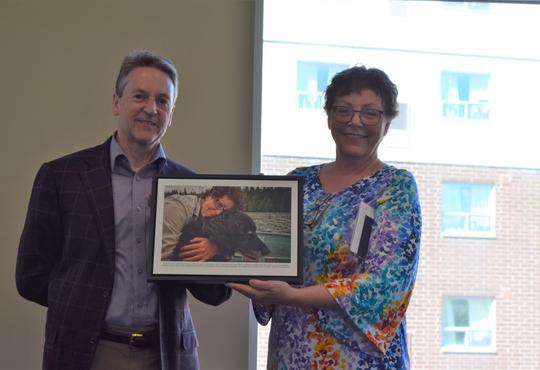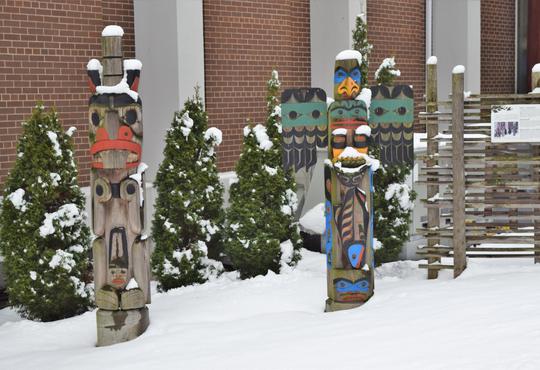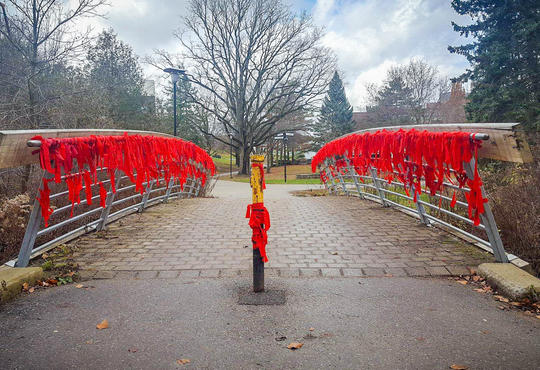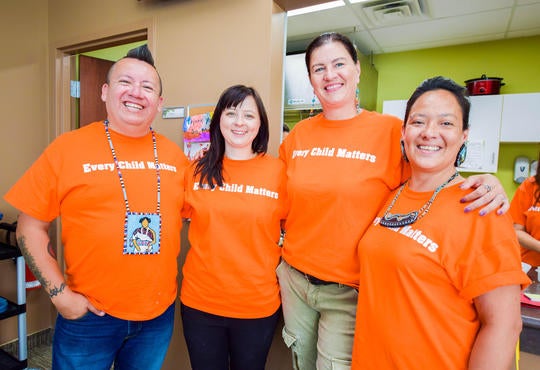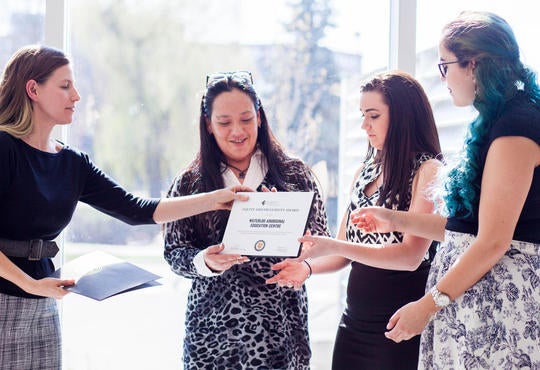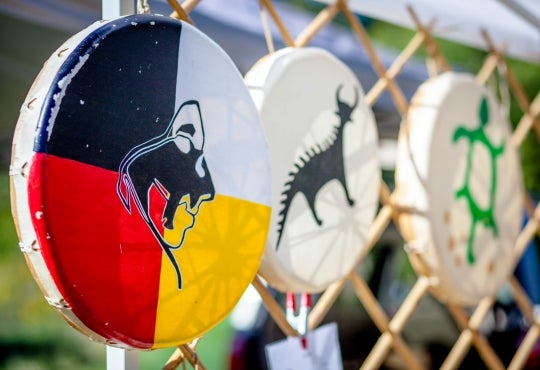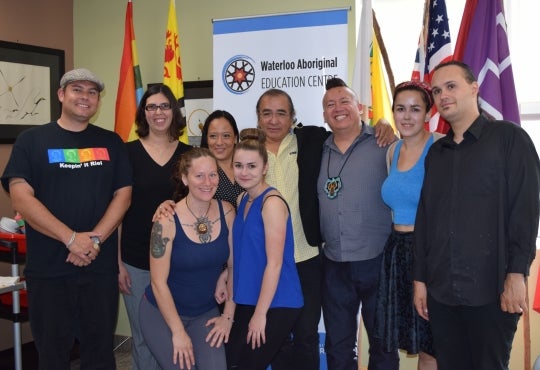New Camp for Indigenous Youth
St. Paul’s has a 15 year history of developing and delivering successful camps for Indigenous youth, but this past May was the first Indigenous Leadership Entrepreneurship and DesignThinking (LEAD) camp ever offered here—or anywhere.
The weeklong camp was organized by former Waterloo Indigenous Student Centre (WISC) Events Coordinator Shawn Johnston and WISC Coordinator, Cheryl Maksymyk in partnership with Google Canada and Okwaho Equal Source consulting. Indigenous communities throughout Ontario were invited to send students in grades 11 and 12 to participate.
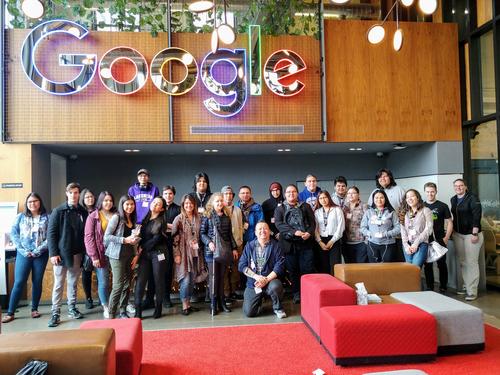
Camp participants and organizers pose below the Google sign at the office in Kitchener
The 17 participants from across the province learned about post-secondary education while visiting UWaterloo, but also participated in an entrepreneurial challenge. With the support of Owaho and St. Paul’s mentors, students formed teams, identified problems in their own communities, considered solutions, and then pitched their solutions to a group of entrepreneurs and engineers at Google’s Kitchener headquarters. Along the way, Owaho staff facilitated design thinking and entrepreneurship workshops, helping youth develop skills to create social impact in their communities.
Students also engaged in cultural activities. Each morning began with a ceremonial smudge while evenings varied from singing and dancing with a Haudenosaunee family to learning the Mohawk language with a Six Nations instructor to the final evening where the Blue Sky Singers and a fire keeper joined camp participants.
Johnson said: “Many of the students, especially those who live in urban contexts, don’t always have the opportunity to make these cultural connections.” Students also had a chance to visit a mall and video arcade.
At the end of the week, the winning pitch addressed the health issue of canine overpopulation in Indigenous communities, with a solution for safe breeding. The winners won tablets provided by WISC.
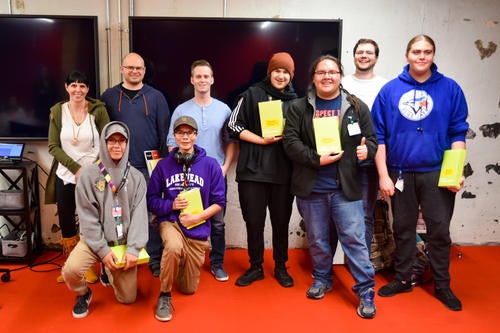 There were many intangible benefits for camp participants beyond the prizes themselves. Johnston said it was encouraging for Indigenous students to be welcomed by Google, and to meet Tara Rush, the only identified Indigenous employee at Google in Kitchener who works between Google Canada and Indigenous communities across the country, as well as meeting the Indigenous consultants from Owaho. The camp also allowed participants to get to know one another better. The chaperone from a community four hours north of Thunder Bay commented that she had worked with her students for years, but that this experience was the first time they had ever made a real connection.
There were many intangible benefits for camp participants beyond the prizes themselves. Johnston said it was encouraging for Indigenous students to be welcomed by Google, and to meet Tara Rush, the only identified Indigenous employee at Google in Kitchener who works between Google Canada and Indigenous communities across the country, as well as meeting the Indigenous consultants from Owaho. The camp also allowed participants to get to know one another better. The chaperone from a community four hours north of Thunder Bay commented that she had worked with her students for years, but that this experience was the first time they had ever made a real connection.
The LEAD camp was made possible with the help of the Ross and Doris Dixon Charitable Foundation thanks to a donation to cover travel expenses for youth coming from remote Northern communities.
There are many ways donors can help us with our work in Indigenous education. Gifts are used to support Indigenous Youth outreach like the LEAD camp, scholarships and awards for Indigenous students, Elders services and other areas such as student leadership opportunities.
André Moreau (BA ’13) receives student leadership award and gives valedictory address at McGill Law convocation
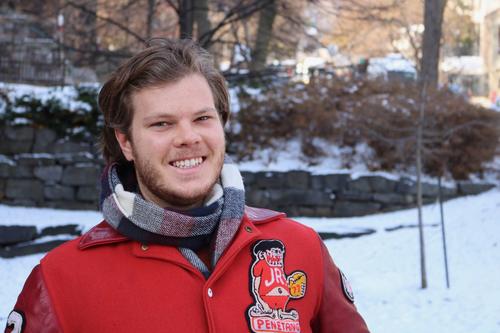 Congratulations are in order for young alumnus and former St. Paul’s employee André Moreau for completing a double degree in Law at McGill with distinction. He was one of six McGill students selected to receive the Gretta Chambers Student Leadership Award in recognition of demonstrated leadership and contribution to the advancement of the McGill community and he was selected by his peers to deliver the valedictory address at the 2019 McGill Law convocation.
Congratulations are in order for young alumnus and former St. Paul’s employee André Moreau for completing a double degree in Law at McGill with distinction. He was one of six McGill students selected to receive the Gretta Chambers Student Leadership Award in recognition of demonstrated leadership and contribution to the advancement of the McGill community and he was selected by his peers to deliver the valedictory address at the 2019 McGill Law convocation.
André was well known around St. Paul’s and Waterloo for being an energetic and outgoing student who championed causes and inspired others to get involved with the campus community. He is remembered fondly by staff at St. Paul's for his efforts to grow student interest in the weekly soup lunch which builds community within the Waterloo Indigenous Student Centre. He tackled all sorts of interesting and delicious soup recipes, giving special care to those which represented his Franco, Métis and Dutch descent.
After graduating in 2013, he stuck around St. Paul’s and UW for about a year and a half to focus on Indigenous student recruitment before moving on to pursue law.
When asked what is on the horizon for the future he tells us he is busy studying for the Ontario Bar and plans to begin articling in August with the National Judicial Institute in Ottawa.
St. Paul's visits Woodland Cultural Centre
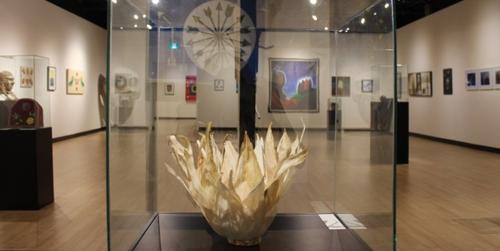
On July 24th, St. Paul’s staff and faculty visited the Woodland Cultural Centre in Brantford. The visit served to launch a new professional development initiative aimed at improving all employees’ understanding of subjects central to the College mission. These subjects include Indigenization, social entrepreneurship, student well-being, international development, human rights and refugee issues.
The St. Paul’s employees began their morning with a guided tour of the exhibits housed at the Woodland Cultural Centre. The tour started with an introduction to the Haudenosaunee peoples and their pre-contact life and worked through European contact and its consequences. College staff were able to view rare artifacts and to hear about personal experiences.
The tour concluded with a video about the experiences of the children who were at the residential school next door, which closed in 1970. It is currently undergoing renovations so that it will be available for public visits as of next year. The video provided a vivid picture of the living conditions in the school, especially as recounted by some of its survivors.
After the visit, some staff shared their insights.
“I was in disbelief – saddened and overwhelmed by the mistreatment of students in the residential schools. This is something that is not talked about, and not well known in Canada. Canadians need to be better educated about it” said Grace of GreenHouse.
“I learned so much at Woodland, which made me think that my educational experience did not do Indigenous people justice. This experience piqued my interest in Indigenous education and I hope to learn more as I progress in my new role at St. Paul’s” said Landon of Advancement and Alumni Relations.
Wishing Shawn well
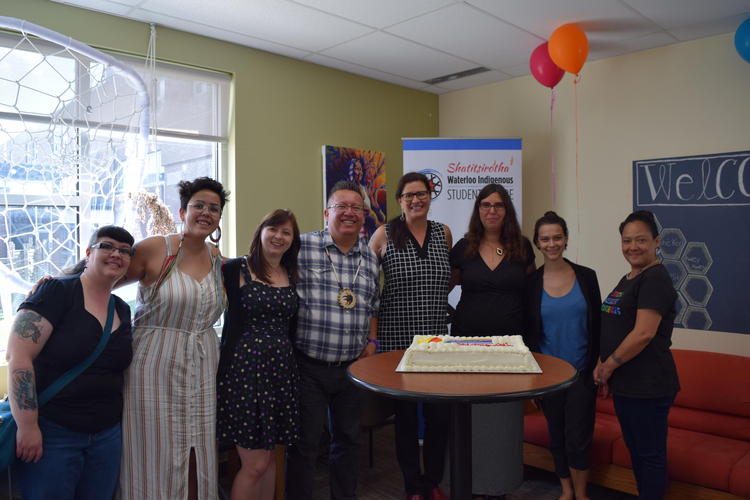
Students, staff, faculty and other members of the St. Paul's/Waterloo Indigenous Student Centre community gathered at the end of August for a special lunchtime send-off of our friend Shawn Johnston.
Shawn spent nearly 5 years working in the Waterloo Indigenous Student Centre as an event planner and recruiter. Well liked by students and staff alike, Shawn was known for colorful watches, big smiles, abundant enthusiasm for new challenges and for always noticing new haircuts. In recent years, Shawn spent a lot of free time working on a photography project called "Nations and Voices" and decided to follow that passion further by returning to school for photo journalism.
To celebrate Shawn's contributions to WISC and St. Paul's, Shawn was gifted a beautiful handmade medallion featuring a crow, a bird with deep symbolic meaning for them. Shawn explained the cultural importance of the crow and shared that some of their favorite memories of working here were during days in early November when thousands of crows darken the skies and fill the trees around campus.
Good luck Shawn!



